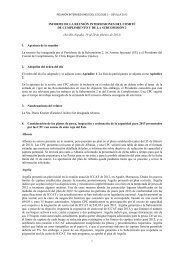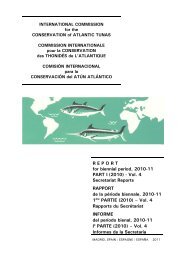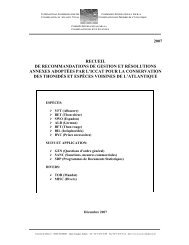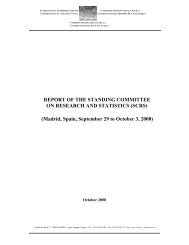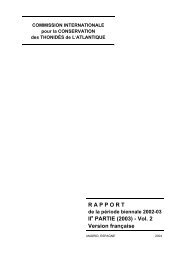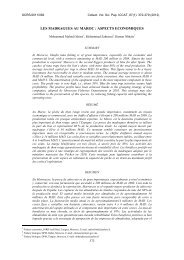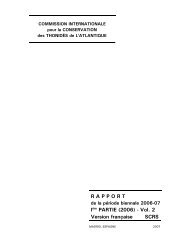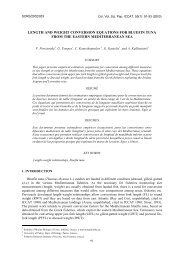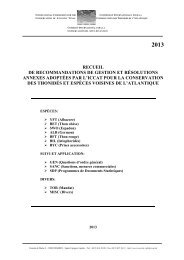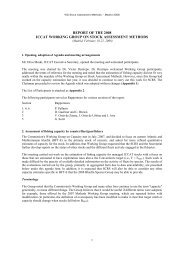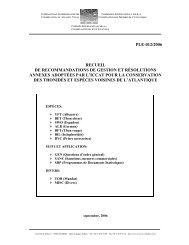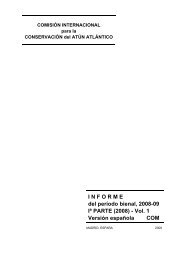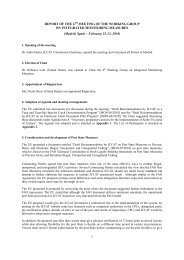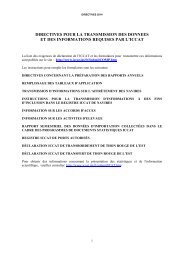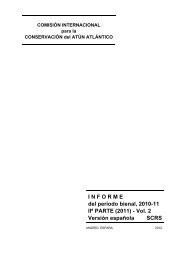E - Iccat
E - Iccat
E - Iccat
Create successful ePaper yourself
Turn your PDF publications into a flip-book with our unique Google optimized e-Paper software.
STACFAD REPORT<br />
tagging program of tropical tunas. He also recalled that this program could be financed by the Working Capital<br />
Fund.<br />
The Delegate from Japan requested information on the budgetary implications of these activities and asked that<br />
they be prioritized.<br />
The Delegate from Morocco supported the research program on small tunas in order to carry out the stock<br />
assessment on small tunas, aimed at improving data and creating a database on these species.<br />
Algeria, Cape Verde, Trinidad & Tobago, and Tunisia supported the research program on small tunas.<br />
The Executive Secretary expressed that there were budget items that could be financed by the ICCAT Budget<br />
and that others could be financed through existing programs.<br />
The Delegate from Japan stated that the Working Capital Fund could be used, but that the amount of the funds<br />
needed would have to be known.<br />
The Executive Secretary explained that the ICCAT Year Research Program for Small Tuna Species (SMTYP)<br />
would be a two-year program and that €56,000 would have to be allocated in both 2013 and 2014, which could<br />
be charged to the Working Capital Fund. He indicated that regarding the rest of the activities he would contact<br />
the SCRS Chair to identify the priorities and try to finance these from the funds of the existing programs.<br />
11. Identification of procedure for granting and implementing the Meeting Participation Fund<br />
The Executive Secretary presented the document on a “Mechanism for Financing the Meeting Participation<br />
Fund” , which shows the contributions received to this Fund (€60,000 from the Working Capital Fund, €10,000<br />
from Morocco, and €27,083.66 from Norway), as well as the costs of the CPCs that had benefited from<br />
participation at meetings. He explained that the document also included an estimate that had been made of<br />
possible requests from all the developing CPCs. He proposed that for 2013 such costs be charged to the Working<br />
Capital Fund and at the 2013 meeting this matter be reviewed for consideration of its inclusion in future regular<br />
budgets.<br />
The Delegate from the European Union proposed that for purposes of knowing the real needs from the fund that<br />
such financing be charged to the Working Capital Fund in 2013 and that the amount destined for this purpose be<br />
reviewed annually.<br />
The Delegate from the United States proposed allocating €150,000 from the Working Capital Fund for 2013 and<br />
that this amount be adjusted every year in order to have a margin that will ensure the participation of all the<br />
CPCs that request assistance.<br />
This proposal was accepted by the rest of the delegations.<br />
12. Other matters<br />
The Chair explained that at the 3rd Meeting of the Working Group on the Future of ICCAT (Madrid, Spain, May<br />
28-31, 2012) there were various requests from the Commission Chair for discussion in STACFAD. The first was<br />
a proposal from Canada to amend Article 9 of the Rules of Procedure on inter-sessional voting (included in<br />
Appendix 7 of the aforementioned Working Group´s report), another was the proposal by Canada on the<br />
objection procedure (Appendix 9 of the Working Group´s Report) (see ANNEX 4.2), and the third dealt with the<br />
concern that various CPCs expressed about the lack of a clear and effective ICCAT communication policy<br />
whereby ICCAT could rapidly and effectively transmit the results of its work. The STACFAD Chair asked<br />
Canada to introduce the first two proposals and the Secretariat the third.<br />
− Amendment of Article 9 of the ICCAT Rules of Procedure on inter-sessional voting.<br />
The Delegate from Canada introduced the proposal to amend the Rules of Procedure concerning inter-sessional<br />
voting to change the method to calculate the quorum during the voting by correspondence, as well as the effect<br />
of the abstentions. The Delegate explained that inter-sessional voting was becoming more common in ICCAT<br />
and that the fact that a CPC did not respond to a vote had an influence on the decision, since not voting was<br />
considered an abstention and therefore had the same effect as a “no” vote. He stated that this proposal intended<br />
223



